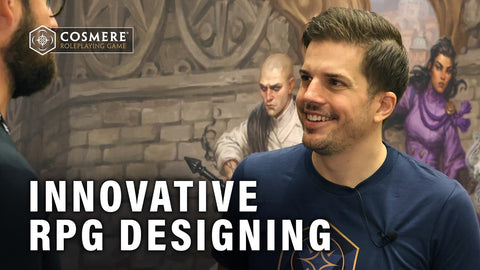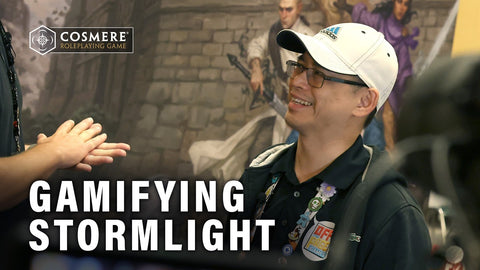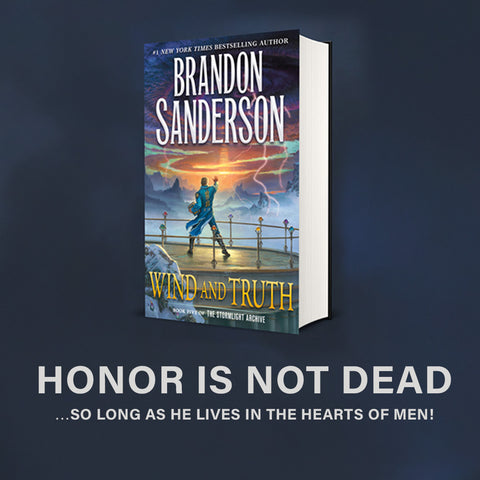The following interview includes paraphrased questions and answers to make it easy to scan through. These are not meant to be taken as direct quotes.
Q: Can you tell us about your role at Brotherwise and how you got involved with Brandon Sanderson's work?
Andrew: I'm the lead designer for the Stormlight Archive RPG, overseeing a team of designers and writers who create the handbook and rules for the game. I’ve been in the industry for about 15 years, working on big licenses like Star Wars and Warhammer. Translating these well-known IPs to the tabletop has given me a lot of experience, and Brandon’s work is particularly exciting because it’s so cinematic and captivating.
Q: For current RPG players, what can they look forward to in this game?
Andrew: We wanted to make the game familiar enough for an easy transition, but with enough novelty to keep things exciting. There are familiar aspects that will get players in the door, but once they’re in, they’ll find new narrative elements to explore. It’s designed for easy onboarding, but with plenty of depth for those who want to dive deeper.
Q: Roshar has a wide range of characters with varying levels of power. How did you approach balancing the game?
Andrew: Balancing the game was crucial, especially with characters like Adolin, who don’t have powers like Radiants. To stay true to the setting, shardblades and surges have to be powerful. We used some mechanical tricks to ensure everyone has fun, regardless of power level. For example, there’s an opportunity cost to pursuing Radiant ideals, and Radiants need to dedicate a lot of time to swearing oaths and using surges. On the other hand, our heroic paths, which aren’t for invested characters, offer powerful narrative abilities that allow for amazing storytelling moments. The setting also provides tools like fabrials and shardblades to even the playing field.
Q: What advice would you give to those inexperienced with RPGs?
Andrew: Start with our level 0 adventure. It’s designed to introduce the game and let you build your character as you play. You don’t need to study mechanics or character-building first—you just jump in and start playing. The mechanics allow you to grow from humble beginnings to powerful characters, just like Kaladin and Shallan in the books.
Q: What makes Roshar such an ideal setting for an RPG?
Andrew: One of the things that make The Stormlight Archive special is that Brandon has mechanized introspection—characters literally grow in power through personal development. That’s an amazing tool for an RPG. While RPGs usually focus on external adventures, our game encourages you to think deeply about your character right from the start. Ideals, oaths, and goals push you to explore why your character does what they do.
Q: How does the game allow players and GMs to shape the story and make it their own?
Andrew: Our goal is to provide a starting point for your story, but it’s just that—a starting point. We have a section in the GM guide on keeping your games canon, but we also give you the tools to make the story your own. Brandon himself is excited about letting players explore and expand his world through their own stories. Ultimately, this game is a toolbox, and we encourage you to run wild with it.
Q: What advice do you have for inexperienced GMs?
Andrew: Being a new GM can be intimidating, but we’ve included a GM chapter to help them dive in. Beyond our game, there are many resources available to onboard new GMs. One potential challenge is the sheer amount of content in Roshar. For example, if you have Radiants in your party, you’ll need to manage spren as well. We’ve structured the system so that players take ownership of their stories, reducing the load on the GM. Think of GMing as collaboratively telling a story with your friends rather than entertaining them.
Q: What are you particularly proud of in the Stormlight RPG?
Andrew: I’m really proud of our combat rules, which you’ll use a lot. We’ve emphasized all types of scenes—conversations, endeavors, and combat. Our flexible action system lets you decide what you want to do and how. We also have a unique initiative system where players choose who goes first based on who wants to act faster or slower, which makes combat feel more dynamic and realistic.
Q: How did you approach non-combat scenes in the game?
Andrew: We’ve mechanized non-combat elements with scene types like conversations and endeavors. These represent activities like exploring, sneaking, and heists—basically, all the adventurous stuff that isn’t fighting. We give you structures to lead these scenes and even have a mental ability called focus that helps with talents in conversations. It’s not just about hitting people harder—you could be convincing someone, calling in a favor, or bribing a contact.
Q: How important are highstorms in the game?
Andrew: Highstorms are crucial for Radiant characters since they’re the source of their power. You’ll need to carry around spheres to recharge your abilities. If you run out of Stormlight, you’ll have to manage your resources carefully. Highstorms also tie into our event system, which GMs can use as a timer for positive or negative events. For example, in one demo, a highstorm was approaching during a battle, and the more complications players rolled, the closer it got.
Q: How do spren work in the game?
Andrew: You don’t start with a spren as your companion. Spren serve as a tool for GMs to communicate with players and for players to express themselves. Each Radiant order has talents that reflect what their spren can do. Spren also play a role in tricky situations, often requiring focus to use effectively.
Q: Can characters upset their spren?
Andrew: Yes, they can! If you abandon your goals or ideals, your bond with your spren can degrade, potentially leading to a loss of powers—similar to what Kaladin experienced in book three. If you go too far, you could lose your spren and powers altogether.




Comments (0)
There are no comments for this article. Be the first one to leave a message!